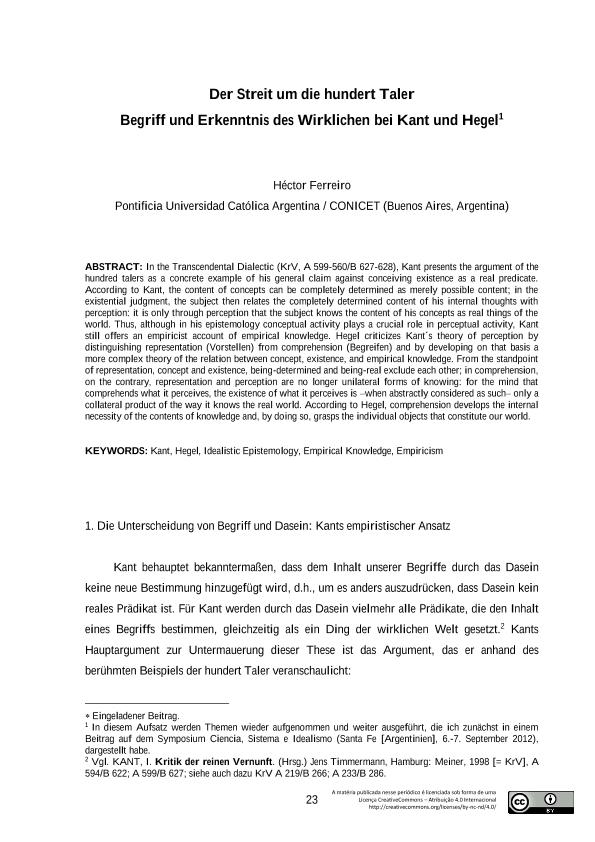Mostrar el registro sencillo del ítem
dc.contributor.author
Ferreiro, Hector Alberto

dc.date.available
2020-11-06T14:20:18Z
dc.date.issued
2016-11
dc.identifier.citation
Ferreiro, Hector Alberto; Der Streit um die hundert Taler: Begriff und Erkenntnis des Wirklichen bei Kant und Hegel; Sociedade Hegel Brasileira; Revista Eletrônica Estudos Hegelianos; 13; 21; 11-2016; 23-38
dc.identifier.issn
1980-8372
dc.identifier.uri
http://hdl.handle.net/11336/117782
dc.description.abstract
In the Critique of Pure Reason (KrV, A 599-560/B 627-628), Kant presents the argument of the hundred talers as a concrete example of his general claim against conceiving existence as a real predicate. According to Kant, the content of concepts can be completely determined as merely possible content; in the existential judgment, the subject then relates the completely determined content of his internal thoughts with perception: it is only through perception that the subject knows the content of his concepts as real things of the world. Thus, although in his epistemology conceptual activity plays a crucial role in perceptual activity, Kant still offers an empiricist account of empirical knowledge. Hegel criticizes Kant´s theory of perception by distinguishing representation (Vorstellen) from comprehension (Begreifen) and by developing on that basis a more complex theory of the relation between concept, existence, and empirical knowledge. From the standpoint of representation, concept and existence, being-determined and being-real exclude each other; in comprehension, on the contrary, representation and perception are no longer unilateral forms of knowing: for the mind that comprehends what it perceives, the existence of what it perceives is ?when abstractly considered as such? only a collateral product of the way it knows the real world. According to Hegel, comprehension develops the internal necessity of the contents of knowledge and, by doing so, grasps the individual objects that constitute our world.
dc.format
application/pdf
dc.language.iso
deu
dc.publisher
Sociedade Hegel Brasileira
dc.rights
info:eu-repo/semantics/openAccess
dc.rights.uri
https://creativecommons.org/licenses/by/2.5/ar/
dc.subject
Filosofía Clásica Alemana
dc.subject
Hegel
dc.subject
Kant
dc.subject
Teoría del Conocimiento
dc.subject.classification
Otras Filosofía, Étnica y Religión

dc.subject.classification
Filosofía, Ética y Religión

dc.subject.classification
HUMANIDADES

dc.title
Der Streit um die hundert Taler: Begriff und Erkenntnis des Wirklichen bei Kant und Hegel
dc.type
info:eu-repo/semantics/article
dc.type
info:ar-repo/semantics/artículo
dc.type
info:eu-repo/semantics/publishedVersion
dc.date.updated
2020-11-05T15:06:29Z
dc.journal.volume
13
dc.journal.number
21
dc.journal.pagination
23-38
dc.journal.pais
Brasil

dc.journal.ciudad
Recife
dc.description.fil
Fil: Ferreiro, Hector Alberto. Pontificia Universidad Católica Argentina "Santa María de los Buenos Aires"; Argentina. Consejo Nacional de Investigaciones Científicas y Técnicas; Argentina
dc.journal.title
Revista Eletrônica Estudos Hegelianos
dc.relation.alternativeid
info:eu-repo/semantics/altIdentifier/url/http://ojs.hegelbrasil.org/index.php/reh/article/view/170
Archivos asociados
